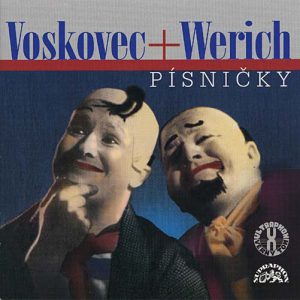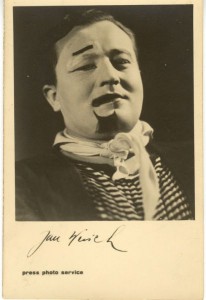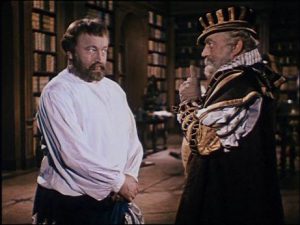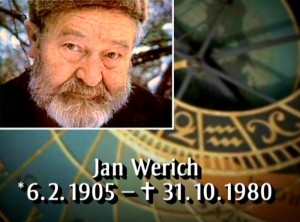Jan Werich: A pioneer in Czech theatre and film
By Tracy A. Burns
Actor, dramatist and screenwriter Jan Werich dazzled the public in both film and theatre productions. The comic duo of Werich and Jiří Voskovec transformed Czech avant-garde theatre between world wars while the man with the deep voice, the chubby cheeks, and glowing smile Santa Claus continued to be a major influence on Czech culture after World War II until his death in 1980.
Meeting Jiří Voskovec
 Born in Prague on February 6, 1905, Werich lived in the Dejvice district as a child. His father was a clerk at an insurance company. Fate intervened during high school when he met schoolmate Jiří Voskovec, the actor with whom he would cooperate for more than 10 years. After high school he took up law at Charles University, studying there from 1924 to 1927. The dynamic duo began their cooperation at the editorial offices of Přerod magazine, a publication for Czech and Slovak legionnaires, members of the armed forces that fought alongside the Allies during World War I and wanted the Entente Powers to help Bohemia and Moravia gain independence from the Austrian Empire and the Kingdom of Hungary. But Voskovec and Werich’s partnership really took off at the Liberated Theatre.
Born in Prague on February 6, 1905, Werich lived in the Dejvice district as a child. His father was a clerk at an insurance company. Fate intervened during high school when he met schoolmate Jiří Voskovec, the actor with whom he would cooperate for more than 10 years. After high school he took up law at Charles University, studying there from 1924 to 1927. The dynamic duo began their cooperation at the editorial offices of Přerod magazine, a publication for Czech and Slovak legionnaires, members of the armed forces that fought alongside the Allies during World War I and wanted the Entente Powers to help Bohemia and Moravia gain independence from the Austrian Empire and the Kingdom of Hungary. But Voskovec and Werich’s partnership really took off at the Liberated Theatre.
Redefining the avant-garde from 1927 to 1932
In 1927 the talented two staged the Vest Pocket Revue, which introduced many elements also evident in their future creations. Inspired by French avant-garde theatre and Japanese Noh theatre, the play had circus-like characteristics, and the actors wore masks. Charlie Chaplin, Stan Laurel and Oliver Hardy, and Maurice Chevalier also influenced their acting as the wise clownish characters tackled people’s stupidity in innovative, verbal battles. They created a new, absurd, fantasy-filled world that sparkled with insanity and wisdom in mostly exotic environments. Until 1932, when their work took on a strong political slant, their productions were entertaining satires commenting on society, unemployment, and a country that was still growing up. They also did much improvisation while discussing current events, often interacting with the audience. From 1927 to 1932 Voskovec and Werich penned 10 plays for the Liberated Theatre. Their credits during this time period include a play focusing on the Golem legend that was staged in 1931. Some other works include the Dynamite Island (1930), North against South (1930), and Don Juan & Co. (1931).
Tackling political themes
 In 1932 their style became much more political when they staged Caesar, in which Italian politician and co-founder of Italian Fascism, Benito Mussolini, is portrayed as Caesar craving for war. The play warned against the dangers of Fascism, which was simmering in Europe. Czechoslovak President Edvard Beneš wanted the play banned, claiming that it was undemocratic. The following year the two thespians created Ass and Shadow with strong anti-Nazi sentiment and an extremely left-wing orientation. Because they utilized the voice of Adolph Hitler in the production, the insulted German Embassy expressed outrage. Executioner and Fool from 1934 also highlighted the dangers of the growing popularity of Fascism and was set in a fictitious country named Mexico, angering the Mexican Embassy.
In 1932 their style became much more political when they staged Caesar, in which Italian politician and co-founder of Italian Fascism, Benito Mussolini, is portrayed as Caesar craving for war. The play warned against the dangers of Fascism, which was simmering in Europe. Czechoslovak President Edvard Beneš wanted the play banned, claiming that it was undemocratic. The following year the two thespians created Ass and Shadow with strong anti-Nazi sentiment and an extremely left-wing orientation. Because they utilized the voice of Adolph Hitler in the production, the insulted German Embassy expressed outrage. Executioner and Fool from 1934 also highlighted the dangers of the growing popularity of Fascism and was set in a fictitious country named Mexico, angering the Mexican Embassy.
From Rag Ballad to A Fist in the Eye
In 1935 the pair were forced to leave the Novák Palace and spent 1935-36 as the Spoutané Theatre in the Rokoko Theatre’s space on Wenceslas Square. This was the setting of their most successful play, Rag Ballad, which celebrated the colorful life of François Villon, the most prominent poet of the Middle Ages as well as a thief, murderer, and vagabond who had a penchant for barroom brawls. After returning to the Novák Palace once again as the Liberated Theatre, they performed Heaven on Earth, Heavy Barbora, A World Behind Bars, and their last production, the anti-Fascist A Fist in the Eye, which was advertised by a poster showing Michelangelo’s David donning a gas mask. Throughout their career Voskovec and Werich worked with director Jindřich Honza, who also directed films, translated, and taught. Another significant colleague was composer and pianist Jaroslav Ježek, whose jazz and swing compositions complemented each performance.
Leaving Czechoslovakia and returning
Both actors spent World War II in the USA, after being forced to emigrate. There they continued to act and also devoted their time to making anti-Nazi broadcasts for the Voice of America. Werich returned to Czechoslovakia in 1945 while Voskovec followed him back a year later. For a short time, the pair performed together again, but they were strictly forbidden to touch upon political themes. In 1948 Voskovec emigrated to France and eventually made his way to the USA, while the avid fisherman and chain smoker stayed in his homeland.
Acting with Miroslav Horníček
The actor who some say resembled Ernest Hemingway wound up working in various theatres, serving as the director of the ABC Theatre from 1956 to 1961. He also founded the Theatre of Voskovec and Werich, where he enchanted audiences with his new partner Miroslav Horníček, who also was a writer, director, theoretician, and painter of collages. Intelligent humor was Horníček’s strength. In 1963 Werich was nationally recognized for his acting achievements.
Films
 Werich shone in over 50 films, becoming a legend on the screen as well as on the stage. Four of his creations with Voskovec were made into films from 1931 to 1937 – Powder and Gasoline (1931), Your Money or Your Life (1932), Heave-ho (1934), and The World Belongs to Us (1937). In these productions the duo’s left-wing leanings were evident. Werich also starred as Emperor Rudolf II and his lookalike, Matěj the baker, in The Emperor and the Golem in 1951. Upon discovering Matěj, the Emperor is convinced he has regained his youth because he had drunk the elixir of youth. Matěj is forced to play the role of emperor. The real emperor finds the legendary Golem, and his advisers murder each other as they try to gain control over the magical, clay figure. In Once Upon a Time There was a King, released in 1954, Werich acted with legendary comic Vlasta Burian as King Me I who has three daughters and desires to give his kingdom to the one he loves most. In When the Cat Comes, which premiered in 1963 and was directed by Vojtěch Jasný, he played the role of Castellan Oliva, who watched the everyday life of his small town from a tower. After he tells a story about a magical tomcat, a feline with superhuman powers appears with a circus that comes to town. The cat makes people change color, the unfaithful turning yellow and those in love turning red. Three men steal the cat, but he is eventually saved and leaves the town.
Werich shone in over 50 films, becoming a legend on the screen as well as on the stage. Four of his creations with Voskovec were made into films from 1931 to 1937 – Powder and Gasoline (1931), Your Money or Your Life (1932), Heave-ho (1934), and The World Belongs to Us (1937). In these productions the duo’s left-wing leanings were evident. Werich also starred as Emperor Rudolf II and his lookalike, Matěj the baker, in The Emperor and the Golem in 1951. Upon discovering Matěj, the Emperor is convinced he has regained his youth because he had drunk the elixir of youth. Matěj is forced to play the role of emperor. The real emperor finds the legendary Golem, and his advisers murder each other as they try to gain control over the magical, clay figure. In Once Upon a Time There was a King, released in 1954, Werich acted with legendary comic Vlasta Burian as King Me I who has three daughters and desires to give his kingdom to the one he loves most. In When the Cat Comes, which premiered in 1963 and was directed by Vojtěch Jasný, he played the role of Castellan Oliva, who watched the everyday life of his small town from a tower. After he tells a story about a magical tomcat, a feline with superhuman powers appears with a circus that comes to town. The cat makes people change color, the unfaithful turning yellow and those in love turning red. Three men steal the cat, but he is eventually saved and leaves the town.
From 2,000 Words to the anti-Charter
During the late 1960s politics once again entered the picture. Werich signed the 2,000 Words petition that voiced discontent with the Communist regime’s pressure to halt the liberal reforms of the Prague Spring. After the Soviet invasion he and his family left for Vienna, but they returned to Czechoslovakia in 1969 because it was home and he had more job opportunities there. Disappointing the dissidents, Werich, while in poor health, did not sign Charter 77, a document criticizing the regime’s disrespect for human and civil rights. Werich signed the anti-Charter, denouncing Charter 77 and professing loyalty to the Communist regime. He even attended meetings promoting the anti-Charter. Werich defended himself by claiming he was duped – he thought he was signing the attendance sheet rather than the anti-Charter. Still, Werich remained extremely popular. The regime saw him as a threat and caused him many problems in totalitarian times. He made his last public appearance at the Lucerna Theatre in 1977.
Writing achievements
Werich, who could be very philosophical as well as very humorous, was an accomplished writer as well. He penned the travelogue Italian Vacation about his trips to Italy during the 1950s while at his cottage in the picturesque village of Velhartice in the Šumava region. His unique fairy tales, Finfárum, are still extremely popular and have been made into three films during this century.
Werich’s Villa
From 1945 until his death in 1980, Werich lived in a 16th-century Baroque villa on Kampa Island near Lichtenstein Palace. Czech historian and writer Josef Dobrovský called the place home during the 18th and early 19th centuries. Poet Vladimír Holan shared the address with Werich, his wife Zdena, and his daughter Jana, from 1948 to 1968. Dubbed “Werich’s Villa,” the building was heavily damaged during the 2002 floods and has only been partially repaired.
Death and legacy
 Werich passed away on October 31, 1980, in Prague after a lengthy illness. Because he did not want a lavish funeral, his many admirers paid their respects at the crematorium in Strašnice as they listened to music by Bohuslav Martinů. His appearances with Voskovec gave a new, dynamic meaning to Czech absurd theatre, and his expressive roles in films during the Communist era were more than memorable, capturing viewers’ hearts. To be sure, Werich helped define Czech theatre and film and had an enormous impact on Czech culture.
Werich passed away on October 31, 1980, in Prague after a lengthy illness. Because he did not want a lavish funeral, his many admirers paid their respects at the crematorium in Strašnice as they listened to music by Bohuslav Martinů. His appearances with Voskovec gave a new, dynamic meaning to Czech absurd theatre, and his expressive roles in films during the Communist era were more than memorable, capturing viewers’ hearts. To be sure, Werich helped define Czech theatre and film and had an enormous impact on Czech culture.



